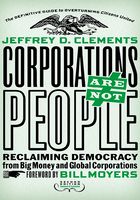
Roots of Citizens United: Earth Day 1970
To see how the Citizens United disaster happened, we need to go back to the 1970s and the formation of the organized corporate campaign to put American democracy on a leash. First came a wave of engaged citizens and responsive government, then came the corporate reaction. Citizens United could not have resulted without the deliberate drive for corporate power and rights that began four decades ago.
After a century of industrialization, Americans had by 1970 had enough of corporations using our rivers, air, oceans, and land as sewers and dumps, leaving most people and communities with the costs and giving the profits to shareholders. One day in April 1970, twenty million Americans of every age and political party came out into the streets and the parks to celebrate the first Earth Day. They demanded a better balance between corporations and people and better stewardship of our land, water, and air. Look at the photos from this first Earth Day and you will see families with children, men in suits and ties and neatly dressed women, working- and middle-class Americans, people of all ages and races.
These millions continued a longstanding American principle of guarding against concentrated corporate power that might overwhelm the larger interests of the nation. This nonpartisan tradition goes back not only to Franklin Roosevelt’s New Deal, not only to Theodore Roosevelt’s Square Deal, but to the founding of America. James Madison, a chief architect of the Constitution, wrote in the early 1800s that “incorporated Companies with proper limitations and guards, may in particular cases, be useful; but they are at best a necessary evil only.” Always willing to be more colorful, Thomas Jefferson said that he hoped to “crush in its birth the aristocracy of our monied corporations, which dare already to challenge our government to a trial of strength and bid defiance to the laws of our country.”
Always willing to be more colorful, Thomas Jefferson said that he hoped to “crush in its birth the aristocracy of our monied corporations, which dare already to challenge our government to a trial of strength and bid defiance to the laws of our country.”
In the 1830s, President Andrew Jackson and his allies battled against the partisan activity of the Second Bank of the United States, a corporation. Jackson pressed the urgent question of “whether the people of the United States are to govern through representatives chosen by their unbiased suffrages or whether the money and power of a great corporation are to be secretly exerted to influence their judgment and control their decisions.” Even President Martin Van Buren, hardly a radical, warned of “the already overgrown influence of corporate authorities.”
Even President Martin Van Buren, hardly a radical, warned of “the already overgrown influence of corporate authorities.”
That first Earth Day in 1970 again awakened our government to the necessity of restoring the balance of corporate power and public interest, of those who control powerful corporations and the rest of Americans. With a Republican president in the White House and bipartisan support in Congress, the extent of reform that quickly followed in the months and a few short years after the first Earth Day remains astonishing:
 Environmental Protection Agency
Environmental Protection Agency
 Clean Water Act
Clean Water Act
 Federal Water Pollution Control Amendments
Federal Water Pollution Control Amendments
 Clean Air Act Extension
Clean Air Act Extension
 Toxic Substances Control Act
Toxic Substances Control Act
 Safe Drinking Water Act
Safe Drinking Water Act
 Wilderness Act
Wilderness Act
 Surface Mining Control and Reclamation Act
Surface Mining Control and Reclamation Act
 Endangered Species Act
Endangered Species Act
 Marine Mammal Protection Act
Marine Mammal Protection Act
 Resource Recovery Act
Resource Recovery Act
 First fuel economy standards for motor vehicles
First fuel economy standards for motor vehicles
These 1970s reforms were long overdue. For a time, they worked, and they made a profound difference in the quality of life of the vast majority of Americans. No longer could dumping untreated sewage and toxic waste in our waters be considered a standard business practice; no longer could corporations walk away from hazardous waste and chemical sites; more wilderness areas preserved more of our birthright and that of future Americans; new laws rejected the industry view that we just had to live with the discharge of brain- and organ-damaging lead from millions of cars and the spread of lead paint in every building in the land; access to clean, safe water was assured for far more Americans; and much more.
The market did not do this. We did this by acting as citizens in a republic.
As with every time in American history, of course, the 1970s were times of crisis and challenge. Yet the American people worked the levers of democracy and saw a connection between those levers—voting, organizing, debating, petitioning, marching—and our government’s conduct.
Environmental balance was not all. We often remember the strife and problems of the late 1960s and early 1970s but think of the progress for the country: in race and gender equality; ending the Vietnam War; real wage growth for average Americans; global leadership in trade and commerce and manufacturing; steady, comprehensive, creative, and effective resistance across the globe to dictatorial communism; public accountability when the president broke the law; more open government and better congressional oversight; manageable debt and budgets in Washington, D.C., and the states; employee rights and safety; and a constitutional amendment to enfranchise millions of Americans from eighteen to twenty years old. The people demanded change; our government delivered change.
The biggest corporations on the planet, however, did not celebrate the responsive democracy that followed Earth Day. Instead, they organized to fund a sustained program to take political power and rights for themselves and away from average Americans. With Citizens United, we see the end game of this project, but it has been years in the making.